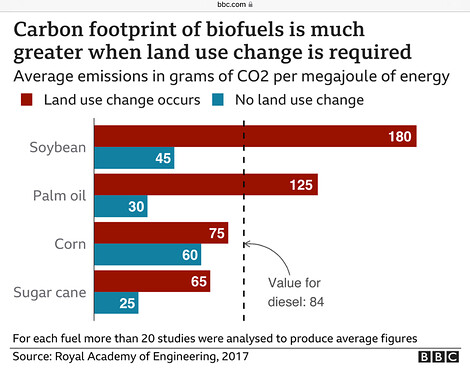Why then? Because electric vehicles are preferable to those powered by infernal combustion engines, even ones burning biofuels, for a range of old-fashioned environmental reasons. And those using regenerative braking, that is, where the vehicle is slowed by recharging the batteries, are more efficient in their energy use.
And some might say an EV can be used to store surplus renewable energy from rooftop solar, although I prefer pumped hydro via the grid for backup, and the car battery slab can certainly have a second life as a household battery. (Every Tesla Powerwall started out life in a Tesla car – no longer good enough to power a car, but plenty good enough to power a house.)
As for how much additional arable land will be needed, that will turn on how far biofuels can be generated from various waste streams – all the ethanol produced in Australia at the moment comes from either flour-milling waste or sugar-refinery waste, and all the biodiesel comes from used cooking oil.
There is also the “waste” I mentioned in my reply to phb above, in the billions of tonnes of stockfeed which is fed directly to cattle instead of first being used as feedstock for ethanol production, with the “distillers grains” produced by that process being superior for feeding animals, so it is an economic win-win as well as a win for the planet.
Once all waste sources have been exhausted, it will turn on which crops prove the most economic.
As I outlined in my reply to phb above, there are vast tracts of land around the world which used to produce food but no longer do so, either because market prices for the food that land used to produce have fallen below the cost of growing on that land, or because governments (principally in America and Europe) have spent public money to stop that land being used because they fear a glut of agricultural produce, that is, to keep food prices up and to keep politically-powerful farmers solvent.
As for the use of water and fertiliser, many biofuel crops, like hemp, can be grown on un-irrigated land without fertilisers of any kind. But there is no shortage of water in Australia, with trillions of litres running into the sea every day, often causing billions of dollars of damage in floods along the way.
Not to mention the humanure which could be used as fertiliser but instead is pumped out to sea from all our major coastal settlements.
